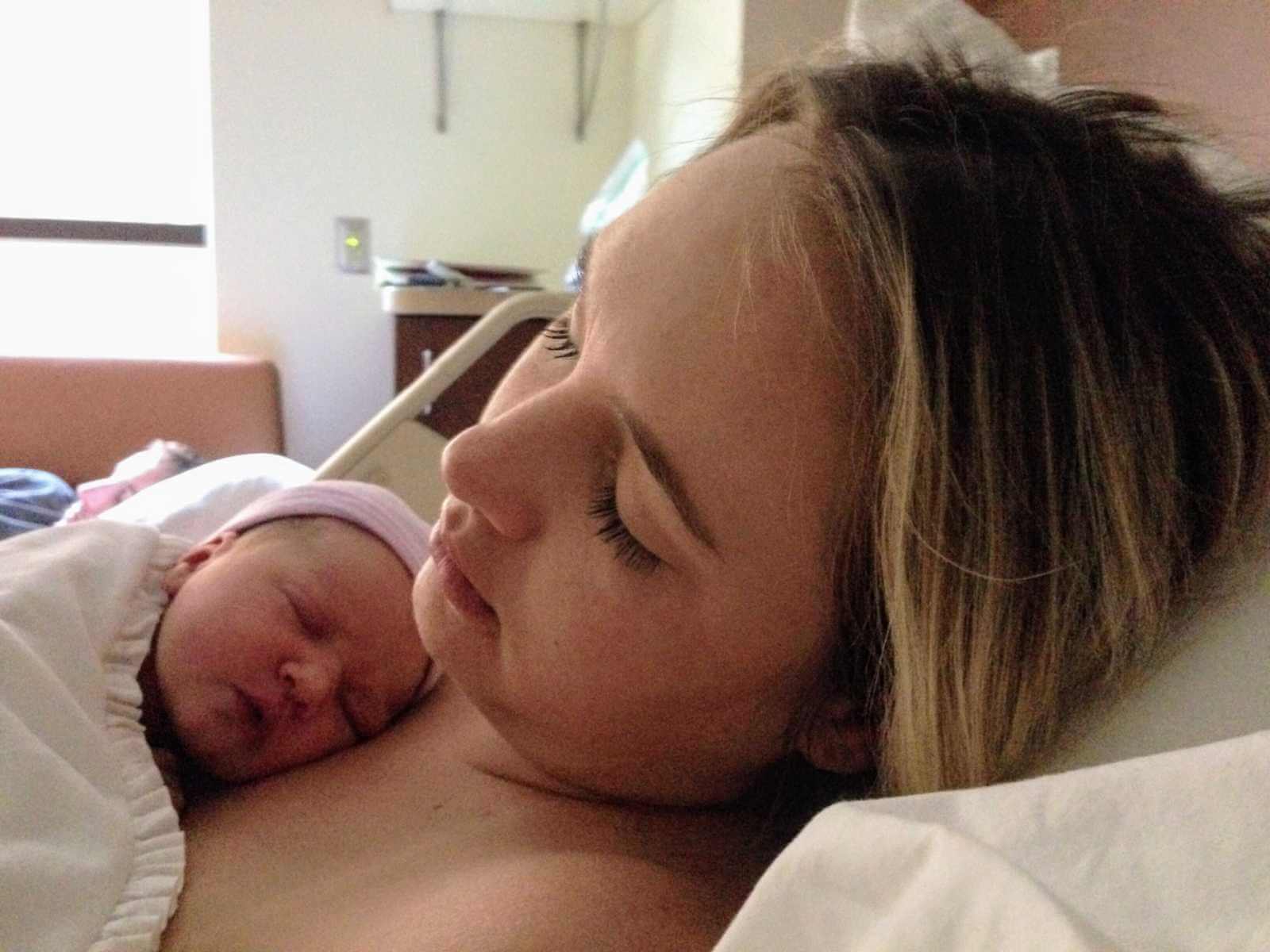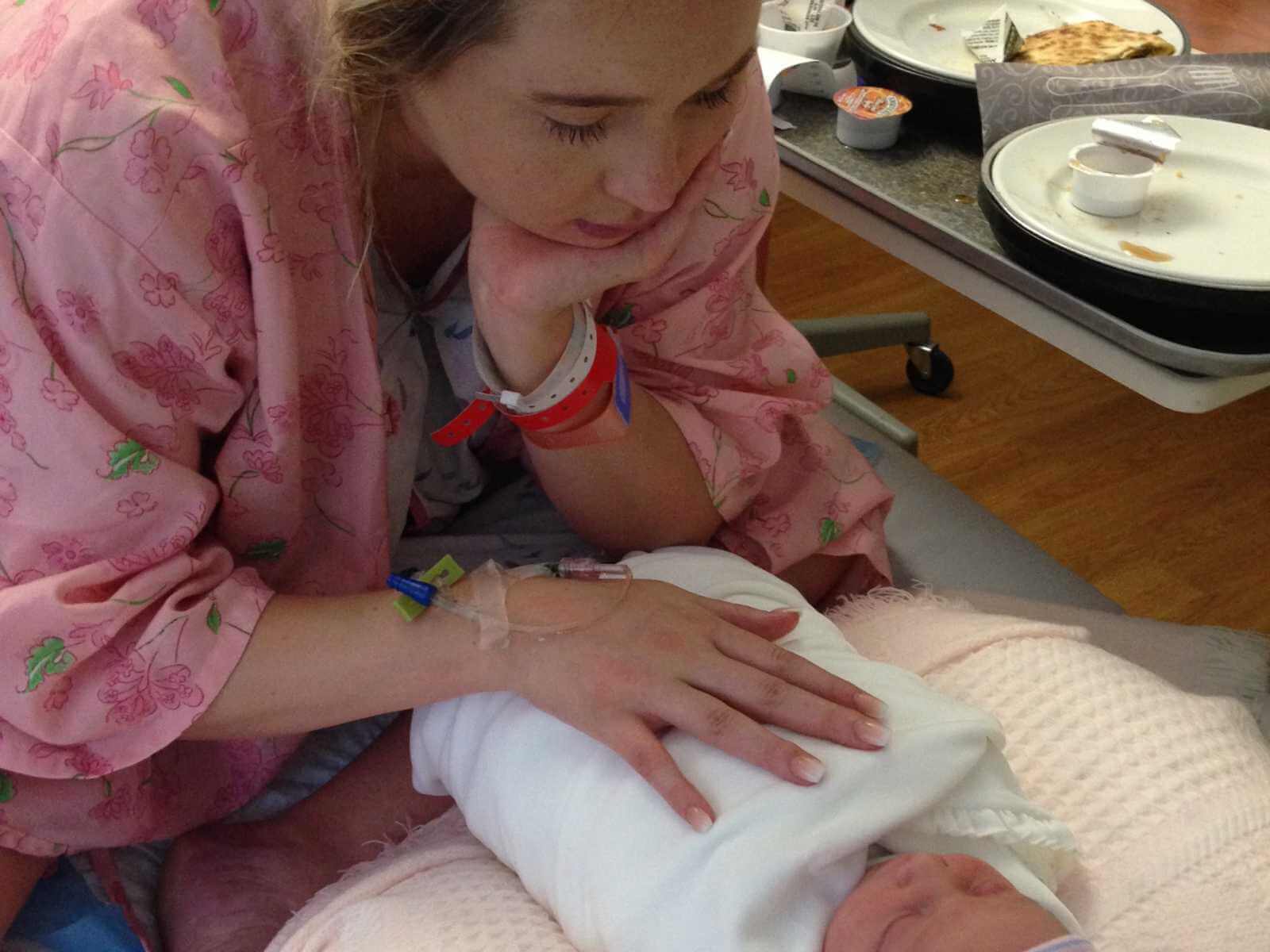On top of the sleepless nights and physical/mental strain that motherhood brings, one new Colorado mom is warning other mothers of a rarely talked about condition that plagued her after the birth of her baby girl.
While postpartum depression (PPD) has become a more prevalent topic discussed on the Internet, few have yet to hear of what’s known as postpartum thyroid condition, a very rare yet serious condition that kills 75 percent of its victims.
“I feel an obligation to be open about a rare postpartum thyroid condition I have developed since giving birth in hopes that raising awareness can help and protect another fellow mom from having to endure and figure out alone what I have had to since December,” wrote Kim Alberts to Love What Matters. “Four months after this picture was taken, my whole world was turned upside down.”

Facebook
Kim explained that she thought she was developing postpartum depression or anxiety when her rapid heart palpitations started on Christmas evening. Her heart was beating so fast it was scaring her, though she was finally able to fall asleep about 3 a.m. that morning. But when the chest pounding came back the next night, she knew something just wasn’t right.
“The next day I couldn’t stand up,” said Kim. “I couldn’t change Elizabeth’s diaper without lying on the ground so dizzy, gasping for air, and blacking out. Same thing when I tried to walk up my stairs or make myself food. I would have to lie on the floor, crying, as I kept holding my chest and feeling how hard my heart was pounding.”
Because she’s a self-acclaimed “stubborn” woman, Kim told her husband, Eric, she agreed to go to the doctor if the problem didn’t relent the next day.
Sure enough, the next day came and went, and the symptoms persisted.
The Urgent Care doctor immediately sent Kim off to the ER when he noticed her heart rate was in an alarming range between the 160s and 170s.
The Emergency Room physician initially thought the problem was a blood clot in her lungs, but her bloodwork ended up coming back positive for a rare condition known as “Thyroid Storm.”
The doctor said in all his years of medical school, residency, and professional practices, he’d never need a case quite like hers.
“He also told me it kills 75% of people that get it, and admitted me immediately for further evaluation,” Kim recalled. “The fact that he was able to correctly diagnose me in such a short amount of time was nothing short of an absolute miracle that probably ended up saving my life. And here I am by myself hooked up to machines trying to breastfeed a 4-month-old in my lap in a different state with no family, no friends, and a husband who was at work in downtown Denver. I am honestly in tears just reliving this day in my mind.”
The following week, Kim’s endocrinologist informed her she had in fact developed Postpartum Thyroiditis (PPT) after giving birth to her daughter.

Facebook
The signs didn’t become clear until she became so intensely hyperthyroid four months after, that she developed Thyroid Storm. All of this was completely uncharted territory for the new mom who had no idea she was even susceptible to such a perfect “storm” of deadly conditions:
“A few years ago, I was diagnosed with Hashimoto’s Thyroiditis, and was never told that if I have children I could potentially develop a condition that NO ONE TALKS ABOUT: Postpartum Thyroiditis. Even during my pregnancy my doctors were aware of my thyroid condition, but never mentioned PPT. Most moms (like myself) who give birth do not get their thyroid levels checked after they have their baby, and most new moms (like myself) dismiss PPT symptoms as PPD symptoms because they are strikingly similar! I cannot say it enough – the symptoms are almost identical!”
Kim thought the nightmare was behind her after she left the hospital, but she couldn’t have been more wrong.
Little did she know, her PPT would make even the simplest of daily functions impossible—and that was only the beginning…
“My hair fell out in clumps every day and since I breastfeed, my baby was covered in it. I lost 15 pounds in six days, I still couldn’t sleep, I could barely regulate my blood sugar, and I would sometimes still have to lie on the floor from being so dizzy just getting myself dressed. I couldn’t fold laundry, make dinner, or hold Elizabeth for too long because my joints and muscles ached so bad and my heart would start palpitating so hard it felt like I was about to pass out.”
Kim admits that as her baby girl Elizabeth would cry, she would cry right along with her because she couldn’t be the mother she needed to be.
The helplessness weighed on her incredibly as she felt like a failure, day in and day out. On top of being unable to properly care for her newborn, Kim’s brain was too foggy to hold conversations, her speech was slurred, and her movements were delayed. She also struggles to breathe, experiences constant chest tightening, and can feel her heartbeat in all of her limbs.
Even today, Kim is still battling these symptoms of her thyroiditis, but she finds purpose in her pain through the hope that her story can help someone else:
“I know so many women who are currently pregnant or wanting to become pregnant that I felt I had a responsibility to share my story. If you have a family history of thyroid disease, PLEASE get your thyroid levels checked after you have your baby. If you have hypothyroidism, hyperthyroidism, or a history or autoimmune thyroid disease, PLEASE get your thyroid levels checked after you have your baby. And keep checking them! Even if you do not have a history of thyroid disease, this CAN still happen to you! Had I been told I could develop PPT since I had a history of thyroid disease I would have prepared myself and gotten my levels checked routinely after Elizabeth was born, but I didn’t know. Knowledge is power, and I want all the mamas out there to be equipped with this information JUST IN CASE because you never think something can happen to you until it does!”
Though Kim has to cope with complex physical and neurological symptoms daily, she says her daughter has been worth every second of it.

Facebook
“She is my heart and soul,” says the beaming mama, who makes a daily effort to smile through the struggle.
“I find hope in knowing that someday I will come across someone like me who will say, ‘I know and understand exactly what you’re going through. I’ve been there.'”
Please SHARE Kim’s story with the women in your life today to raise awareness for this little-discussed, yet profoundly serious condition, and read her full story on Love What Matters.
Prayers for Kim’s speedy healing and recovery!

